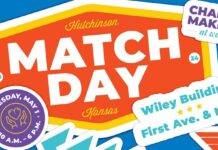From the Office of Public Affairs | http://www.news.ku.edu
Headlines
Best strategies for designing crowdfunding campaigns revealed in new study
LAWRENCE — A University of Kansas assistant professor of business is the co-author of a new scholarly article, “Designing Rewards-Based Crowdfunding Campaigns for Strategic (but Distracted) Contributors.” The research delves into successful crowdfunding strategies for campaigns on sites such as Kickstarter and GoFundMe.
KU to host French Ambassador to the United States to celebrate department designation
LAWRENCE — The University of Kansas Department of French, Francophone & Italian Studies will host the French Ambassador to the United States to celebrate the department’s designation as a Center of Excellence through the French Embassy. Ambassador Philippe Etienne will be in Lawrence on Sept. 12 for a morning event with faculty and students from the department. The ambassador will be accompanied by the French Consul General in Chicago, Yannick Tagand.
KPR celebrates 70 years of classical music with Live Day on Sept. 15
LAWRENCE – Kansas Public Radio will celebrate its 70th anniversary with a day of live classical music on Sept. 15. Individuals may attend these free concerts at the Lawrence Public Library or listen to the broadcast live from KPR and the Lied Center of Kansas. Ad Astra, a local piano and cellist duo, will kick off the day at 9 a.m. in the KPR Live Performance Studio.
Full stories below.
————————————————————————
Contact: Jon Niccum, KU News Service, 785-864-7633, [email protected]
Best strategies for designing crowdfunding campaigns revealed in new study
LAWRENCE — Kickstarter. Indiegogo. GoFundMe.
Crowdfunding platforms have financially leveled the field for those interested in launching a new product or backing a particular cause. These popular sites reportedly added $65 billion in revenue to the global economy in 2020.
“The crowdfunding model is an amazing way to raise funds because you are bypassing all the institutional infrastructure,” said Soudipta Chakraborty, assistant professor of business at the University of Kansas.
“There are no banks. No venture capitalists. You’re cutting out the middleman and raising funds directly from the end consumers of the product. So this is an amazing business model … but there are all these problems.”
Such problems led Chakraborty to write “Designing Rewards-Based Crowdfunding Campaigns for Strategic (but Distracted) Contributors.” The paper studies how to devise such campaigns when backers choose not only whether to contribute, but also when to contribute. It appears in Naval Research Logistics.
According to Chakraborty, who co-wrote the paper with Anyi Ma of Tulane University and Robert Swinney of Duke University, a typical crowdfunding campaign lasts around two months. Most see plenty of traffic right at the beginning because creators reach out to family, friends and co-workers to secure pledges. Then comes a period of slow activity. This is sometimes followed by a “last-minute surge” before the deadline.
“Previously, people thought this surge happens because the contributors of the pledges are altruistic and want to see the creator and the campaign succeed. But we found it might not always be the case. This last-minute surge can happen due to people strategically withholding because they want to see if it’s going to get funded,” he said.
“If you think about it, there are not many reasons to withhold your pledges. On most sites, if your campaign doesn’t succeed, then the contributors get their money back. So there is almost no risk.”
What Chakraborty discovered was that seemingly small “frictions” for an individual contributor during the campaign often have a big influence on supporting the creator of the product. For instance, simply filling out credit card details can dissuade a potential funder, causing them to wait until weeks later or even not engage at all.
“We’ve come up with ways in which creators can overcome this problem of people waiting strategically,” he said.
“One way of doing that is using menus, where you have the same product but you charge different prices depending on when people are getting in. So there could be the same product sold at, say, $100. The first few individuals who decide to contribute will get this lower price. Anyone who decides to wait will have to get the same product at a higher price.”
Chakraborty’s team used a mathematical model to study what is called “equilibrium” in game theory. The researchers set this up to where everyone – from the creator of the project to the target of the campaign – is acting in their own best interest, then verified the model using real-life experiments.
The professor first became drawn to this topic when he read a report stating only 1 in 10 crowdfunding platforms deliver the product that is promised. It remains one of many misconceptions people have about crowdfunding.
“Especially for rewards-based crowdfunding, the most misunderstood aspect is it’s like buying something on Amazon. ‘You can go on Amazon and press click and get something delivered to you.’ But that’s not what crowdfunding is. There is an inherent risk because you are investing in something that has not yet been developed. Kickstarter is not a store,” he said.
Now in his second year at KU, Chakraborty specializes in operations management. His primary research interest involves improving new business models.
Chakraborty himself has invested in a Kickstarter campaign, which raised funds for a device that could remind drivers where they parked their vehicle.
“It was a really bad product,” he said. “Every time you’d stop at a red light, it would indicate that your car was parked.”
That experience further emphasizes the 1-in-10 delivery statistic.
“There is an inherent risk to this business model,” Chakraborty said. “And sometimes sites allow all sorts of unscrupulous actors who will take advantage of that.”
One other discovery from his research may surprise those who are familiar with crowdfunding.
Chakraborty said, “Crowdfunding campaigns either fail miserably or they do well and succeed. But it almost never happens that the creator raises 80% of the target and then loses. It’s either only 20% of the target is raised or it’s fully funded. This in-between scenario is very rare. Our model can explain this observed quirk.”
-30-
————————————————————————
The official university Twitter account has changed to @UnivOfKansas.
Refollow @KUNews for KU News Service stories, discoveries and experts.
Tweets by KUnews
————————————————————————
Contact: Joe Monaco, Office of Public Affairs, 785-864-7100, [email protected], @UnivOfKansas
KU to host French Ambassador to the United States to celebrate department designation
LAWRENCE — The University of Kansas Department of French, Francophone & Italian Studies will host the French Ambassador to the United States to celebrate the department’s designation as a Center of Excellence through the French Embassy.
Ambassador Philippe Etienne will be in Lawrence on Sept. 12 for a morning event with faculty and students from the department. The ambassador will be accompanied by the French Consul General in Chicago, Yannick Tagand.
“We are delighted to host the French Ambassador to the United States, His Excellency Philippe Etienne, as well as Consul General Tagand,” said Bruce Hayes, chair of the department and professor of French. “We are deeply honored by their visit, and we are pleased that the French Embassy has designated the Department of French, Francophone & Italian Studies a Center of Excellence. This designation will provide wonderful opportunities for our students and faculty and is an important recognition of the work being done by our faculty, students and staff.
“With the establishment of this new partnership, I look forward to further strengthening the bonds between KU and the French Embassy.”
The department was officially designated a Center of Excellence in August 2022, becoming just the 25th department in the nation to earn the prestigious recognition. Other designated universities include Brown, Princeton, Harvard and Yale, as well as state schools such as the University of California-Los Angeles, the Ohio State University and the University of Wisconsin.
The Centers of Excellence were established by the French government to promote French culture in American universities and increase ties between scholars, artists and public intellectuals in France and the U.S.
“The international profile and strength of our students and faculty is the main reason we were able to earn the designation as French Center of Excellence,” said Van Kelly, professor of French and director of graduate studies, who will serve as the center’s director. “The French Center crosses academic disciplines and fields, and KU is rich in students and faculty who engage in outreach with French and Francophone cultures.”
-30-
————————————————————————
Subscribe to KU Today, the campus newsletter,
for additional news about the University of Kansas.
http://www.news.ku.edu
————————————————————————
Contact: Emily Fisher, Kansas Public Radio, 785-864-0190, [email protected], @kprnews
KPR celebrates 70 years of classical music with Live Day on Sept. 15
LAWRENCE – Kansas Public Radio will celebrate its 70th anniversary with a day of live classical music on Sept. 15. Individuals may attend these free concerts at the Lawrence Public Library or listen to the broadcast live from KPR and the Lied Center of Kansas.
Ad Astra, a local piano and cellist duo, will kick off the day at 9 a.m. in the KPR Live Performance Studio. Cucharada will directly follow at 10 a.m. in the Lawrence Public Library atrium, which will be open to the public, featuring live tango music.
Performances will continue to alternate every hour between the KPR Live Performance Studio and the Lawrence Public Library until 2 p.m. Additional performers include pianist Sławomir Dobrzański, the St. Petersburg String Quartet, and woodwind and piano trio Allégresse.
The evening will conclude with a live broadcast featuring a concert by Kansas City violinist Destiny Ann Mermagen, along with accompanying pianist Tatiana Tessman and cellist Michael Mermagen from the Lied Center at 7 p.m.
KPR’s Darrell Brogdon and Cordelia Brown will host the broadcast. Highlights from the event will re-broadcast from 2 to 3 p.m. on KPR or online at kansaspublicradio.org.
-30-
————————————————————————
KU News Service
1450 Jayhawk Blvd.
Lawrence KS 66045
Phone: 785-864-3256
Fax: 785-864-3339
[email protected]
http://www.news.ku.edu
Erinn Barcomb-Peterson, director of news and media relations, [email protected]
Today’s News is a free service from the Office of Public Affairs





